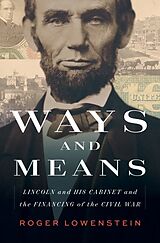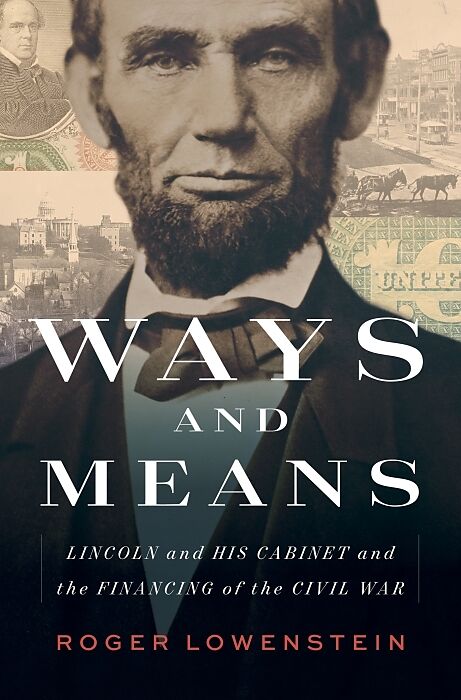Ways and Means
Einband:
Fester Einband
EAN:
9780735223554
Untertitel:
Lincoln and His Cabinet and the Financing of the Civil War
Genre:
Branchen
Autor:
Roger Lowenstein
Herausgeber:
Random House N.Y.
Anzahl Seiten:
448
Erscheinungsdatum:
08.03.2022
ISBN:
978-0-7352-2355-4
“Ways and Means represents nonfiction writing at its best, using an easy prose to enlighten with thought provoking, sometimes controversial, ideas from the very beginning.” —New York Journal of Books
“Ways and Means, an account of the Union’s financial policies, examines a subject long overshadowed by military narratives . . . Lowenstein is a lucid stylist, able to explain financial matters to readers who lack specialized knowledge.” —Eric Foner, New York Times Book Review
“[Lowenstein] makes what subsequently occurred at Treasury and on Wall Street during the early 1860s seem as enthralling as what transpired on the battlefield or at the White House . . . His keenly perceptive study details how the protagonists eventually came to reimagine their finances—and ultimately, their economic cultures . . . Captivating.” —Harold Holzer, Wall Street Journal
“[A] fresh look at the president’s essential Republican roots as a self-made man, rather than slaveholder, and belief that anyone could be successful in America . . . An accessible exploration of how war enabled the federal government to acquire real financial power.” —Kirkus
“Lowenstein delivers a fine account of a crucial yet overlooked aspect of the American Civil War.” —Booklist
“Journalist Lowenstein (The End of Wall Street) argues in this masterful history that the financing of the Civil War was as crucial to the shaping of American history as the Emancipation Proclamation and the defeat of the Confederacy . . . Lucid, character-driven . . . Full of fascinating historical tidbits and clear explanations of complex financial and political matters, this is a must-read for American history buffs.” —Publishers Weekly (starred review)
“In Ways and Means, Roger Lowenstein gives a gripping account of how Lincoln and his secretary of Treasury, Salmon P. Chase, successfully won the financial war against the South, by a combination of better economic policies and by raising unprecedented amounts of money in unprecedented ways. It also tells the deeper story of how Lincoln used the opportunity thrown up by war to forge a new economic union, even as he was remaking the political union. Ways and Means is a tour de force of narrative history, riveting and eye-opening, that provides a novel and original perspective on our greatest president.” —Liaquat Ahamed, Pulitzer Prize-winning author of Lords of Finance: The Bankers Who Broke the World
“In this riveting narrative, Roger Lowenstein has delivered an outstanding contribution to the rich literature on the Civil War. With deft prose, unrivaled financial acumen, and a sure feel for personalities, he brilliantly illuminates the economic history of the war, a dimension so sorely neglected in the past. This volume will certainly rank as the classic treatment of the subject for a very long time to come.” —Ron Chernow, author of Grant
Autorentext
Roger Lowenstein has written numerous critically acclaimed books, including the New York Times bestsellers Buffett, When Genius Failed, and The End of Wall Street. He has three children and lives with his wife, Judy Slovin, in Cambridge, Massachusetts, and Tenants Harbor, Maine.
Klappentext
From renowned journalist and master storyteller Roger Lowenstein, a revelatory financial investigation into how Lincoln and his administration used the funding of the Civil War as the catalyst to centralize the government and accomplish the most far-reaching reform in the country's history
Upon his election to the presidency, Lincoln inherited a country in crisis. Even before the Confederacy's secession, the Treasury of the United States had run out of money, and had no authorization to raise taxes, no federal bank, and no currency. But from setbacks Lincoln foresaw opportunity, the chance to legislate in the spirit of the "more perfect union" - the very Hamiltonian ideal of centralism to which the Confederates objected. With Lincoln at the helm, the US would now govern "for" its people:it would enact laws, create departments, make available homesteads, build roads, establish a currency, endow universities, raise armies, and impose taxes, for them.
Lincoln appointed Salmon Chase, his former rival for the Republican presidential nomination, as Secretary of the Treasury. Chase, an ardent abolitionist, waged war on the financial front: levying taxes, marketing bonds, and fighting inflation. And while the Union and Rebel armies fought increasingly savage battles, the Republican-led Congress enacted a blizzard of legislation that made the government, for the first time, a powerful presence in the lives of ordinary Americans, offering a visible hand in the hope that, as Lincoln wrote, "every man [might] have the chance." What followed was no less than revolutionary: The 37th Congress legislated for a transcontinental railroad, involved the federal government in agriculture, education, and land policy, and established a progressive income tax and the internal revenue bureau; it could be said it created the government itself. The Union was now self-sustaining, but concurrently the South was in freefall, having failed to leverage its control of the world's cotton supply to finance the war. The Confederacy's flaws were evident within its founding principles: no central authority, which meant no taxing power, and no financial assets. The subsequent collapse of the Southern economy was one of epic proportions. Though Confederate troops continued to hold their own, the financial advantage enjoyed by the North compared to the starving citizens of the Confederacy was decisive; the war was won not on the battlefield, but in the banks.
Here for the first time, Roger Lowenstein reveals the unlikely story of how Lincoln used the urgency of financing the Civil War to transform a union of states into one united nation. Through a financial lens, he explores how this second American revolution, led by Lincoln, his cabinet, and his congress, completely changed the direction of the country and established, for the first time, a government of the people, by the people, and for the people.
Story Locale: Washington DC
Zusammenfassung
“Captivating . . . [Lowenstein] makes what subsequently occurred at Treasury and on Wall Street during the early 1860s seem as enthralling as what transpired on the battlefield or at the White House.” —Harold Holzer, Wall Street Journal
“Ways and Means, an account of the Union’s financial policies, examines a subject long overshadowed by military narratives . . . Lowenstein is a lucid stylist, able to explain financial matters to readers who lack specialized knowledge.” —Eric Foner, New York Times Book Review
From renowned journalist and master storyteller Roger Lowenstein, a revelatory financial investigation into how Lincoln and his administration used the funding of the Civil War as the catalyst to centralize the government and accomplish the most far-reaching reform in the country’s history
Upon his election to the presidency, Abraham Lincoln inherited a country in crisis. Even before the Confederacy’s secession, the United States Treasury had run out of money. The government had no authority to raise taxes, no federal bank, no currency. But amid unprecedented troubles Lincoln saw opportunity—the chance to legislate in the centralizing spirit of the “more perfect u…

Leider konnten wir für diesen Artikel keine Preise ermitteln ...
billigbuch.ch sucht jetzt für Sie die besten Angebote ...
Die aktuellen Verkaufspreise von 5 Onlineshops werden in Realtime abgefragt.
Sie können das gewünschte Produkt anschliessend direkt beim Anbieter Ihrer Wahl bestellen.
Loading...
Die aktuellen Verkaufspreise von 5 Onlineshops werden in Realtime abgefragt.
Sie können das gewünschte Produkt anschliessend direkt beim Anbieter Ihrer Wahl bestellen.
| # | Onlineshop | Preis CHF | Versand CHF | Total CHF | ||
|---|---|---|---|---|---|---|
| 1 | Seller | 0.00 | 0.00 | 0.00 |
